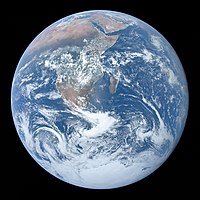
Photo from wikipedia
The “Earthrise” photograph, taken on the 1968 Apollo 8 mission, became one of the most significant images of the 20th Century. It triggered a profound shift in environmental awareness and… Click to show full abstract
The “Earthrise” photograph, taken on the 1968 Apollo 8 mission, became one of the most significant images of the 20th Century. It triggered a profound shift in environmental awareness and the potential for human unity—inspiring the first Earth Day in 1970. Taking inspiration from these events 50 years later, we initiated Project Earthrise at our 2020 annual conference of inVIVO Planetary Health. This builds on the emergent concept of planetary health, which provides a shared narrative to integrate rich and diverse approaches from all aspects of society towards shared solutions to global challenges. The acute catastrophe of the COVID-19 pandemic has drawn greater attention to many other interconnected global health, environmental, social, spiritual, and economic problems that have been underappreciated or neglected for decades. This is accelerating opportunities for greater collaborative action, as many groups now focus on the necessity of a “Great Transition”. While ambitious integrative efforts have never been more important, it is imperative to apply these with mutualistic value systems as a compass, as we seek to make wiser choices. Project Earthrise is our contribution to this important process. This underscores the imperative for creative ecological solutions to challenges in all systems, on all scales with advancing global urbanization in the digital age—for personal, environmental, economic and societal health alike. At the same time, our agenda seeks to equally consider our social and spiritual ecology as it does natural ecology. Revisiting the inspiration of “Earthrise”, we welcome diverse perspectives from across all dimensions of the arts and the sciences, to explore novel solutions and new normative values. Building on academic rigor, we seek to place greater value on imagination, kindness and mutualism as we address our greatest challenges, for the health of people, places and planet.
Journal Title: International Journal of Environmental Research and Public Health
Year Published: 2021
Link to full text (if available)
Share on Social Media: Sign Up to like & get
recommendations!